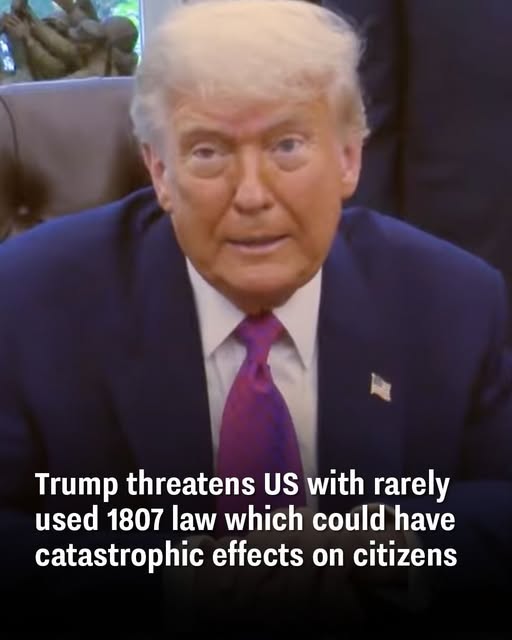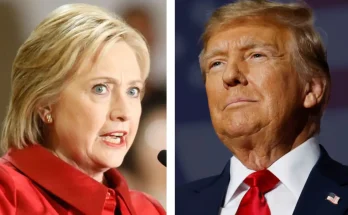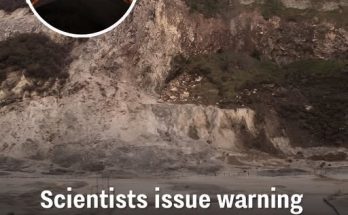
Former President Donald Trump may soon invoke the Insurrection Act, a law that has been in existence for centuries and permits military intervention on American soil. As unrest escalates in Los Angeles and other cities, Trump’s actions are raising concerns regarding the expansion of presidential power. He has already deployed active-duty troops and assumed control of the California National Guard. Consequently, governors, civil rights organizations, and judges are resisting this move. Ultimately, this confrontation transcends Los Angeles; it serves as a test of the limits of presidential authority to deploy military forces.
What Is the Insurrection Act, and Why It Matters
The Insurrection Act of 1807 empowers presidents to mobilize the military during insurrections or when there is a breakdown of federal law. It supersedes the Posse Comitatus Act, which typically prohibits military involvement in civilian law enforcement. Historically, most presidents have refrained from utilizing this act. The last invocation occurred during the 1992 Los Angeles riots. Now, Trump seems poised to set a new precedent. Although he has not officially activated the law, his recent actions indicate he is preparing to do so. Therefore, the implications are significant, as this law confers extensive powers with minimal oversight.
Title 10 and the Federalization of the National Guard
Trump invoked Title 10 of the U.S. Code to assume control of California’s National Guard. Normally, such an action requires the approval of governors. However, Trump asserted a federal emergency and proceeded without consent. As a result, California lost command over its Guard forces. This contentious application of federal authority has triggered immediate legal challenges. Critics contend that Title 10 does not warrant the circumvention of state authority unless a clear national threat is present.
Legal Confrontation as California Resists
Governor Gavin Newsom acted swiftly. He promptly initiated a lawsuit to prevent Trump’s actions. The state contended that the federalization of its National Guard without permission infringed upon the Tenth Amendment, which safeguards states’ rights. On June 12, 2025, U.S. District Judge Breyer concurred and mandated the return of the Guard to state authority. Nevertheless, Trump declined to comply. As a result, a federal appeals court granted a temporary stay, permitting Trump to maintain control until the subsequent hearing. That session is set for later this month.
Marines Deployed in Los Angeles Amidst the Insurrection Act’s Influence
In addition to the National Guard, Trump dispatched 700 active-duty Marines to Los Angeles. He asserted that their presence was necessary to safeguard federal buildings. While this rationale may adhere to the legal framework, critics argue it stretches the law’s intended purpose. The Posse Comitatus Act prohibits military personnel from serving as domestic law enforcement. However, the protection of federal property can be considered an exception. By not formally invoking the Insurrection Act, Trump’s deployment challenges the boundaries of presidential power. Consequently, this action has ignited both legal and political backlash.
A Rare Historical Context
Presidents seldom resort to the Insurrection Act. In fact, it has only been employed in extraordinary circumstances, such as enforcing civil rights or quelling riots. For instance, Dwight Eisenhower invoked it to desegregate schools in 1957. The most recent application occurred in 1992, when George H.W. Bush addressed the Rodney King riots. Currently, Trump appears more inclined to utilize the law as a political instrument. Should he proceed, he will establish a precedent that diminishes the threshold for future presidents.
Governors Raise Concerns
Throughout the nation, governors are sounding alarms. Newsom characterized Trump’s actions as undemocratic. Similarly, other state officials express apprehension regarding federal overreach. They fear that the White House might employ military force against political adversaries. As a result, this opposition illustrates the increasing friction between state governance and federal authority. Today, it is California. Tomorrow, it may be another state. Thus, numerous governors feel it is essential to reassess the powers of presidential emergency authority.
Civil Rights in Jeopardy
Civil liberties organizations, such as the ACLU, caution that military engagement jeopardizes essential freedoms. When soldiers patrol urban areas, the environment frequently transitions from tranquil to hostile. Consequently, public demonstrations may either diminish or intensify. Detractors contend that Trump’s strategies are designed to intimidate those who oppose him. Should he invoke the Insurrection Act, the circumstances could escalate into a broader suppression of lawful protests.
Judicial Intervention
Federal judges are now pivotal in this matter. Judge Breyer determined that Trump exceeded his legal boundaries. Nevertheless, the 9th Circuit granted a temporary stay, permitting Trump to maintain authority over the Guard. As the case progresses, legal experts anticipate a significant ruling in the near future. This decision could serve as a crucial turning point. Ultimately, it will elucidate the extent of military authority the president can wield domestically.
Divided Public Sentiment
The American populace is profoundly polarized. Some endorse Trump’s stringent measures, viewing them as vital for restoring order. Others argue that such actions undermine democracy. Simultaneously, many citizens remain perplexed about the actual provisions of the Insurrection Act. This ambiguity contributes to the prevailing tension. As Trump persists in advancing his agenda, confidence in both federal and local governance appears to diminish further.
Where is Congress in all of this?
Up to this point, Congress has largely remained uninvolved. A handful of lawmakers have advocated for restrictions on executive authority, yet no substantial measures have been taken. Given that the Insurrection Act grants presidents extensive discretion, there is a potential for future misuse. Legislators could take action now to define the law’s intent and constraints. If they fail to do so, the subsequent president might further extend its application.
The Future of Presidential Authority
Trump’s actions have sparked renewed discussions regarding the boundaries of presidential power. The Insurrection Act was never intended to fulfill political objectives. However, its vague wording renders it susceptible to exploitation. As courts consider the matter and governors push back, the resolution of this conflict will influence future approaches to civil disorder. Ultimately, the country must determine whether to impose stricter limits on executive power or risk permitting even greater federal oversight.


